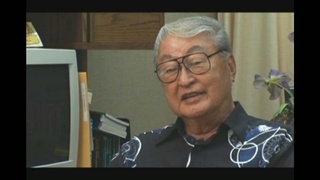Interviews
The Kona Island community
I think the difference came about not with my parents, but with their product, which are the children of my parents, and the children of Kona for example. Somewhat different from other communities because Kona is very independent, and the people there are very outspoken and they are generally supposed to be stubborn farmers and determined. Because the community was a predominant society, by that I mean we were predominantly Japanese. The Filipinos, Portuguese, Chinese were all minority. So we grew up in a dominant society of Japanese. And that’s why the people in Kona are different in the sense that they are confident, determined, and self-assured.
Date: May 29, 2006
Location: Hawai`i, US
Interviewer: Akemi Kikumura Yano
Contributed by: Watase Media Arts Center, Japanese American National Museum
Explore More Videos

The importance of Japanese American role models in childhood community
(b. 1955) Lawyer

Recognizing issues of dual identity in the nisei generation
(b. 1955) Lawyer

Heightened awareness of identity as a Japanese American
(b. 1955) Lawyer

Starting a medical program in Hawai‘i
(b.1925) Sansei, cardiovascular surgeon.

Father's role in starting the Wailea Milling Company
(1925 - 2018) Nisei educator from Hawai‘i



Taking over husband’s orchid farm and nursery
(1925 - 2018) Nisei educator from Hawai‘i

Victory Corps Work during World War II
(1925 - 2018) Nisei educator from Hawai‘i

Growing up with some Japanese families (Spanish)
(b. 1950) Nisei Chilean, Businessman

The various realities of Nikkei in Latin America (Spanish)
(b. 1950) Nisei Chilean, Businessman

Relief fund to support Japanese communities (Japanese)
(1900–1996) The mother of Nikkei Brazilian immigration

Role of Assistancia Social dom Jose Gaspar (Japanese)
(1900–1996) The mother of Nikkei Brazilian immigration


Support from the Japanese American community
(b.1971) Professional figure skater and Olympic gold medalist.
